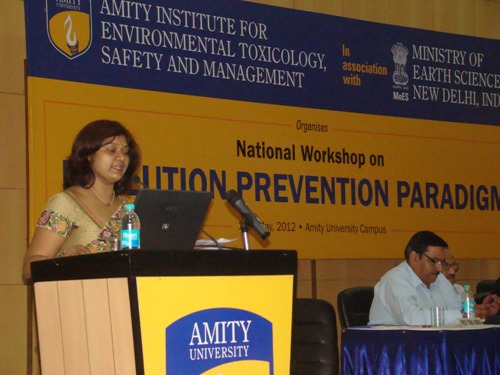11 May 2012|Noida | Amity University Campus, Sector-125, Noida
“70% of water pollution is caused by domestic waste and 30% by industrial waste”, reveals experts during a Workshop on “ Pollution Prevention Paradigm” at Amity University

Amity Institute for Environmental Toxicology, Safety and Management in association with Ministry of Earth Sciences, New Delhi organized a National Workshop on “Pollution Prevention Paradigm” at Amity Campus, Sector-125, Noida.
The various topics discussed and deliberated during the day long workshop included “Urbanization and Air Pollution”, “Sewage Waste and Water Contamination”, “Current Environmental Issues and Heath Impacts”.
Prof. Tanu Jindal- Workshop Chairperson and Director, Amity Institute for Environmental Toxicology, Safety and Management gave a bird’s eye view of the workshop and expressed her concern over the increasing air, water and soil pollution which challenges the very existence of mankind. She expressed her hope that the workshop will provide a forum to the scientists, policy makers, NGOs and budding researchers to debate on the linkage of development with environment related issues.
Speaking during the occasion, Dr. G V Subrahmanyam- Advisor, Ministry of Environment and Forests, Government of India said, “nature and humanity form inseparable part of life support system. Air, water, land, flora and fauna are the five elements of life support system, which are indeed interrelated and interdependent. Deterioration in any one affects the other. If the deterioration is for short duration and life support system is resilient, it gets back to shape but if the deterioration is for long duration, the life support system is thrown out of gear. All environment related provisions have human benefit and welfare at its centrality.” Sharing an interesting fact, Dr. Subrahmanyam stressed that there are over 3 million small scale industries in India and more than 60% of the pollution is contributed by small scale industries alone against the large scale industries which are generally taken as real culprits. Dwelling on the ways to combat pollution problem, he suggested that the mindset of the people needs to be changed. Cleaner and greener production should be encouraged. The environmental challenges are mounting and capacity building in terms of manpower and infrastructural facilities has to done to handle such challenges.
Expressing his concern over the increasing pollution, Dr. Ashok K Chauhan- Founder President, Amity Group stressed that in the ongoing race in the name of development, earth is rapidly loosing its natural resources which will adversely impact the future generations. Dr. Chauhan assured that over the next 6 months, 12 research projects and 6 patents in the area of Pollution Prevention will be filed by Amity University.
Highlighting the adverse effects of pollution on human beings, Mr. Tomothy Neely- Chief- Environment, Science and Technology Affairs, U. S Embassy remarked that there are very minute yet harmful particles present in polluted air which are fatal for human well being. In fact, air pollution is one of the top causes of mortality across the globe and over 1 million premature deaths are attributed to air pollution worldwide. Childern are more susceptible to air borne diseases because they are very active and stay outdoors most of the time. Moreover, their resistance is also low as compared to grown ups. Mr. Timothy suggested that proactive approach in dealing with pollution is better than corrective approach and reducing pollution at the source is more effective and economical than trying to curb it when it goes out of control.
Prof. S P Gautam- MP. Public Service Commission, Former Chairman, CPCB opined that the mindset of the people regarding the word “WASTE” has to be changed, there is nothing called waste but only residuals which need to be convrted into value added products. He called upon everybody to promote and practice 4 R’s- Reduce, Reuse, Recycle and Recover. He further shared that 70% of water pollution is caused by domestic waste. Although the industrial waste is more complex but domestic waste has more quantum. Pointing to the steps that need to be taken to combat increasing pollution, Prof. Gautam suggested that Source Proportioning Studies should be done to ascertain the proportion of pollution contributed by various contaminants and all the pollution related data should be developed through GPS and GIS devices.
Dr. S K Raza- Director, Institute of Pesticide Formulation Technology, Gurgaon vividly brought out the lacuna affecting the pollution control in India. He emphatically lamented the fact that although there are numerous legislations in place to check the pollution in the country but enforcement is lacking. Every year DST and other organizations give fellowships and projects to research scholars but unfortunately, the results of their research are not implemented. Dr. Raza opined that the same technologies which generate pollution are also at the same time helping the industry to progress No doubt that pesticides are polluting the environment but, they were also responsible to bring about “Green Revolution” in the country. Dr. Raza further suggested that judicious use of pesticides with right formulations can take care of the contamination of air, water and soil.
Also present during the occasion were Dr. Rajesh Kapur- Scientist ‘G’, Department of Biotechnology, Government of India, Maj Gen K J Singh- Vice Chancellor, Amity University, Dr. B Shukla- Pro Vice Chancellor, Amity University Dr. Sunil Saran- Sr. Vice Chairman, Amity Science Technology and Innovation Foundation, Prof. S. S Agrawal- Director General, Academic, Innovation and Research Coordinator and other Directors, Head of the Departments/ Institutions, Senior lecturers and faculty members.
During the day topics discussed included Micro and Macro Perspectives for Urbanization and Air Pollution, Qualitative and Quantitative Approaches to Articulate Urbanization and Air Pollution, Sustainable and Affordable Decentralized Wastewater Management, Wastewater Treatment and Perspective in India, Reuse and Recycle of Wastewater Treatment, Environmental Issues and Public Health and many more.